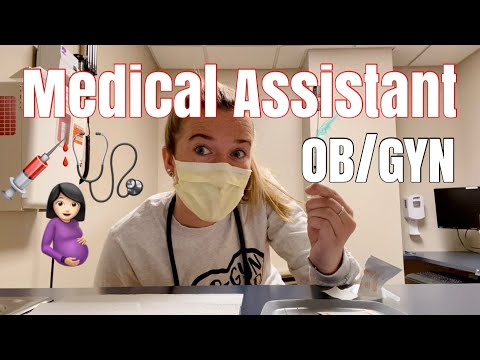Medical Assistants: Understanding the Scope of Practice
Contents
- What is a medical assistant?
- The medical assistant scope of practice
- The medical assistant’s role in patient care
- The medical assistant’s role in administrative tasks
- The medical assistant’s role in clinical tasks
- The medical assistant’s role in medical billing and coding
- The medical assistant’s role in insurance reimbursement
- The medical assistant’s role in patient education
- The medical assistant’s role in research
- The medical assistant’s role in Quality Assurance
Medical assistants are versatile health care professionals who perform both clinical and administrative duties. They work closely with physicians, nurses, and other health care staff to provide patient care.
Checkout this video:
What is a medical assistant?
Medical assistants are healthcare professionals who perform a variety of clinical and administrative tasks to support the work of physicians and other medical professionals. They are a vital part of the healthcare team and play an important role in providing quality patient care.
Medical assistants typically have a broad range of responsibilities, which may include greeting patients, scheduling appointments, taking medical histories and taking vital signs, among other tasks. In some states, they may also be allowed to perform certain clinical procedures, such as giving injections or removing sutures.
The scope of practice for medical assistants varies from state to state. It is important to understand the scope of practice in your state so that you can be sure that you are performing only those tasks that are within your legal authority.
The medical assistant scope of practice
Medical assistants (MAs) play a vital role in the healthcare system, providing support to physicians and other medical professionals. MAs typically have a wide range of responsibilities, from administrative tasks to clinical duties. While the exact scope of practice may vary from state to state, there are certain tasks that MAs are generally allowed to perform.
Administrative duties:
MAs can typically perform a variety of administrative tasks, such as scheduling appointments, maintaining medical records and billing insurance companies.
Clinical duties:
MAs may also be responsible for performing certain clinical tasks, such as taking medical histories and measuring patients’ vital signs. In some states, MAs may also be allowed to give vaccinations and take x-rays.
While the exact scope of practice may vary depending on the state in which you work, there are certain tasks that MAs are generally allowed to perform. By understanding the scope of practice for medical assistants, you can be sure that you are providing quality care within the bounds of your authority.
The medical assistant’s role in patient care
Medical assistants play an important role in patient care. They are the ones who take vital signs, give injections, draw blood, and perform other routine tasks. They also keep the medical office running smoothly by scheduling appointments, handling billing, and doing other administrative work.
Most medical assistants have at least a high school diploma, though some have completed formal training programs. Some states require medical assistants to be certified. In order to become certified, medical assistants must pass an exam administered by the American Association of Medical Assistants or the National Healthcare Association.
Medical assistants typically work in doctors’ offices, clinics, and hospitals. They usually work Monday through Friday during regular business hours. However, they may occasionally be required to work evenings or weekends to cover for other staff members who are on vacation or out sick.
The medical assistant’s role in administrative tasks
Medical assistants play a vital role in the smooth running of any medical practice. In addition to performing clinical tasks such as measuring patients’ vital signs and administering injections, medical assistants also handle a variety of administrative duties. These can include scheduling appointments, maintaining patient records, billing and coding insurance claims, and handling correspondence.
While the scope of practice for medical assistants varies from state to state, most states allow medical assistants to perform routine administrative tasks without supervision. However, there are some tasks that medical assistants are not legally allowed to do without supervision from a licensed medical professional. These tasks include prescribing medication, ordering diagnostic tests, and giving injections.
The medical assistant’s role in clinical tasks
Medical assistants (MAs) play a vital role in modern health care. They are specially trained to perform both administrative and clinical tasks in physicians’ offices, hospitals, and other outpatient health care facilities.
MAs are typically responsible for a wide range of tasks, from greeting patients and scheduling appointments to taking medical histories and recording vital signs. They also may assist physicians with examinations, administer medications and injections, and prepare patients for diagnostic tests. In addition, MAs often perform basic laboratory procedures, such as taking blood and urine samples, and process X-rays.
While the scope of an MA’s practice varies by state, most MAs are allowed to perform many routine clinical tasks without physician supervision. However, MAs must always follow the specific instructions of the physician they are working with.
If you are considering a career as a medical assistant it is important to have a clear understanding of the scope of practice for this occupation. This will help you make sure that you are prepared for the tasks you will be expected to perform on the job.
The medical assistant’s role in medical billing and coding
Medical assistants play an important role in medical billing and coding. They are responsible for accurate coding of diagnoses and procedures, as well as correctly entering patient information into the medical record. Medical assistants must be familiar with the coding system used by their facility, as well as the documentation requirements of their payors.
In addition to coding, medical assistants may also be responsible for charge entry, verifying insurance benefits, and collecting patient payments. They may also assist with scheduling appointments and gathering prior authorization approvals from insurance companies.
The medical assistant’s role in insurance reimbursement
Before a health care provider can be reimbursed by an insurance company, the provider must first file a claim. The medical assistant’s role in insurance reimbursement is to prepare and submit these claims on behalf of the provider.
The medical assistant may also be responsible for verifying that the patient has coverage under their particular plan, and that the services provided are indeed covered. In some cases, the medical assistant may need to contact the patient directly to obtain missing information or to clarify details of their coverage.
It is important to note that medical assistants are not allowed to give patients advice about which insurance plans to choose, or about how to maximize their coverage. This type of advice must be provided by a licensed health care professional.
The medical assistant’s role in patient education
Medical assistants play an important role in patient education. They are usually the first point of contact between the patient and the medical team, and they have a unique opportunity to explain procedures, educate patients about their health, and provide support and encouragement.
Patient education is an important part of the medical assistant’s job, but it is not always easy. Medical assistants must be able to effectively communicate with patients of all ages and backgrounds. They must also be able to understand and explain complicated medical information.
The scope of practice for medical assistants varies from state to state. In some states, medical assistants are allowed to perform certain tasks that would normally be performed by a licensed health care provider, such as taking patient histories or giving injections. In other states, medical assistants are limited to performing clerical tasks and providing basic patient education.
Medical assistants should be aware of the scope of their practice so that they can provide the best possible care for their patients.
The medical assistant’s role in research
Research is vital to the advancement of medicine. Medical assistants (MAs) play an important role in the research process by working with patients, collecting data, and maintaining records. It is important to understand the scope of practice for MAs in order to ensure that they are used effectively in research.
MAs are able to work with patients to collect information about their medical history, symptoms, and medications. They can also take vital signs and collect laboratory specimens. In addition, MAs can assist with research studies by administering surveys andquestionnaires and collecting data.
MAs are not licensed health care providers and cannot provide direct patient care or prescribe medications. They also cannot interpret laboratory results or perform diagnostic tests. In order to protect patients and ensure that research is conducted ethically, it is important that MAs understand their scope of practice.
The medical assistant’s role in Quality Assurance
Medical assistants play an important role in Quality Assurance (QA) activities in healthcare organizations. QA is a process used to ensure that medical care meets certain standards of quality. Medical assistants can help to improve the quality of patient care by participating in QA activities and providing feedback to the QA team.
Some of the ways in which medical assistants can participate in QA activities include:
-Observing and documenting patient care procedures
-Reporting observed problems or concerns to the QA team
-Assisting with QA audits or reviews
-Providing input on ways to improve patient care procedures
-helping to develop and implement Quality Improvement Plans







